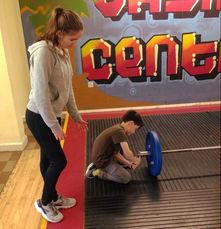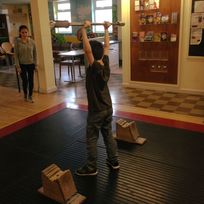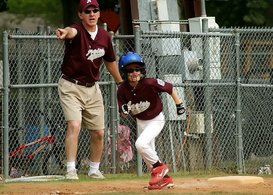AuthorA 20 year old fitness enthusiast and dedicated Olympic style weightlifter. I am a Level 2 Weightlifting coach, Powerlifter, and non-competitive Irish dancer. I'm determined to live a healthier lifestyle and take care of my body whilst influencing other young people to do so. I never doubt my ability to achieve something; I just change what I'm doing until I succeed. Archives
May 2021
|
Back to Blog
Recently due to tearing a ligament in my ankle, I've sadly had to step away from my Olympic Weightlifting schedule and training. On the bright side, this has given me much more of a chance to coach, shadow my coach and understand what it requires to coach children Olympic Weightlifting. Carry on reading to hear tips from a child about coaching younger children. Getting to know who you're coachingI think its excellent when coaches know about their kids individually. Its one thing knowing the name of who you're coaching and their performance ability, but it's also great to get to know other things about who you're coaching. For example, learning about any other sports they may be good at, what they want to be when they're older, what their goals are in the sport, what they think about their achievements etc. If a coach knows these things about who they're coaching, this could give them the chance to provide opportunities for the kids. Whilst shadowing over my Weightlifting coach, I have noticed that with new lifters who are beginning to learn the technique, he'll ask them if they do any other sports and perhaps mention how Weightlifting will improve those sports or mention something he knows about the sport. Let them have funThis is something that not all coaches will apply when teaching children a sport or skill. It's important to remember that children are still growing and learning from their mistakes, this means most children will want things to be fun and dislike boring activities. There are infact ways to make learning sports fun, rather than coaches repetitively instructing and cramming information into small growing minds for long periods of time. Personally, looking at a coaching situation from a child's eye, it is probably better to teach children when also letting them have fun, in order to let them release energy. However, including games when coaching is great but making sure children are safe in the process is the most important. Some children (because of their age) may not understand the danger of some activities, hence why the coaches should decide when children are to train and when children are to have fun. Use different methods of coachingWhen coaching children, not every child learns the same way. For example, here are some ways a child may learn something:
Changing what you coach Myself showing a young lifter how to correctly attach a collar to a bar Myself showing a young lifter how to correctly attach a collar to a bar Its important to alternate what you're coaching to children during sessions, but still making sessions relevant to the information you're trying to pass across. For example, if you were trying to teach children how to understand the point system or noticing the technique of others, getting them to score each others lifts would be appropriate but different. I've also encouraged my coach to explore the variation of coaching Olympic Weightlifting and Powerlifting to the children as this is something which we both feel will help build strength, improve the key positions and even help gain points through the squat. Even if children aren't gaining new personal bests every session, it is still an achievement if a child is taught something which they didn't know about the sport or skill. For more information about the Olympic Weightlifting point system for children under the age of 13, see the link below. Instructing the group, as a group An individual lifter being coached An individual lifter being coached When I went on my work experience in March to a gym, I often overlooked individual personal training sessions and fitness group classes. I noticed that when personal trainers were helping their clients, sessions would be a lot more close as the personal trainers were able to guide just the one person. However, in a group fitness class, a person was given help when others were occupied. Meaning that groups were never left standing around or waiting for the class to continue whilst one person caught up. To instruct a person in the group class, quick demonstrations or key words were often repeated or the entire group was reminded again about the issue. This should be the way that groups of children learning a sport or skill should be handled. Sometimes if children are left to their own devices, boredom or distractions can occur. Often instructing individuals in a group can be appropriate if the group are watching the person being put on the spot. For example, if a group of children were to examine one lifter in the group to help recognise competition structure. Showing strictness with reason A mistake which shouldn't be made is being too strict when coaching children (or simply being too lenient). Coaches should remember that children are merely growing and trying to grasp new concepts almost daily! Some may take longer than others and some may differ in confidence. But this isn't something which coaches should view as a weakness or simply that children are being naughty. To recognise whether a child is purposely doing something which requires strictness or some rules being enforced, think about the child's age, emotions, capabilities and reason. There may be a significant reason behind the child's actions which could easily be resolved by somebody just taking the time to realise that the child cannot always help what they're doing. Being too strict when coaching could cause a childs behaviour to worsen if they dislike the way they're being treated. By being too lenient when coaching, children could mess about which results in being in a dangerous situation due to feeling the need to gain the attention of the coach. Thats why by explaining and asking the child why they're behaving like that or telling them the benefits of the activity which they may be refusing to do, can help give reasons to the child as to why they should listen to the coach. Thank you for reading this post. Please note that I am still a child myself when writing this and have some experience when coaching Olympic Weightlifting to children. This post is simply from my eyes and explains my examination of several years worth of coaching. In no way have I gained a coaching certificate yet and simply provide this post to give tips and advice from a child's point of view.
0 Comments
Read More
Your comment will be posted after it is approved.
Leave a Reply. |